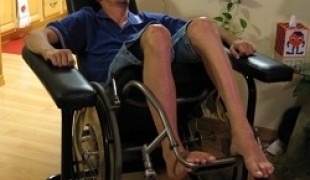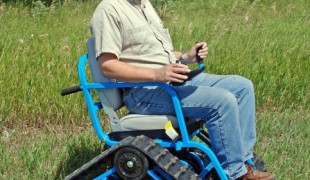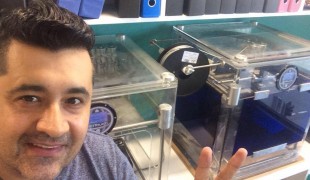- 8302
- 572
- 4
- 10
- 0
- Help Ukraine
About the solution
His invention is a screw-based, motorized wheelchair transfer device using a reclaimed ATV motor and a battery pack that allows users to get in and out of wheelchairs by themselves.
“I saw that the people are always sitting and I wondered if there were health benefits if they could stand. So, I researched it and I found out that they get muscle atrophy and blood circulatory problems and pressure sores from always sitting. Then I researched standing wheelchairs and found that there are already standing wheelchairs available, but most of them are $8,000 to $10,000. So I wanted to build one that is cheap and affordable that anyone could buy”, the inventor explained.
“My original prototype was a crank with a pulley, then I motorized it,” Daniel said.
He tested the device, and right now it supports about 500 pounds.
“But I would like to change the body, the seat, from wood-based to, maybe, 3D-printed plastic”, Daniel said.
The whole chair costs between $400 and $500.
Adapted from: http://www.notimpossiblenow.com/lives/teen-invents-standing-wheelchair
What about you, do you have any solutions? Please share them with the Patient Innovation community!
This solution shall not include mention to the use of drugs, chemicals or biologicals (including food); invasive devices; offensive, commercial or inherently dangerous content. This solution was not medically validated. Proceed with caution! If you have any doubts, please consult with a health professional.
DISCLAIMER: This story was written by someone who is not the author of the solution, therefore please be advised that, although it was written with the utmost respect for the innovation and the innovator, there can be some incorrect statements. If you find any errors please contact the patient Innovation team via info@patient-innovation.com
-
-
609
-
0
-
9971

Wheelchair Accessible Recliner
MOVING IN A WHEELCHAIR: Moving using a wheelchair.
CAREGIVING
Cervical spinal cord injury/Tetraplegia
Walking Aid (wheelchair/walker/crutches)
Managing pain
Promoting self-management
Preserving Organ Function
Promoting inclusivity and social integration
Maintaining Balance and Mobility
Restoring Blood Circulation
Preventing (Vaccination, Protection, Falls, Research/Mapping)
Internal Medicine
Neurology
Orthopedics
Rheumatology
United States
-
-
-
441
-
0
-
6573

Parents create a track-chair for their paralysed son
MOVING IN A WHEELCHAIR: Moving using a wheelchair.
CAREGIVING
Paralysis
Neuromuscular Disorders
Walking Aid (wheelchair/walker/crutches)
Assistive Daily Life Device (to help ADL)
Gait abnormalities (e.g., walking difficulties, unsteady gait)
Difficulty coordinating movements
Stiffness or rigidity (difficulty moving)
Paralysis of the legs and lower body
Muscle weakness
Loss of balance
Promoting inclusivity and social integration
Maintaining Balance and Mobility
Preventing (Vaccination, Protection, Falls, Research/Mapping)
Caregiving Support
Neurology
Neurosurgery
Orthopedics
Rheumatology
United States
-
-
-
391
-
0
-
5027

HU-GO - a 3D printed wheelchair
MOVING IN A WHEELCHAIR: Moving using a wheelchair.
Cervical spinal cord injury/Tetraplegia
3d Printed
Walking Aid (wheelchair/walker/crutches)
Restoring mobility
Promoting self-management
Promoting inclusivity and social integration
Maintaining Balance and Mobility
Preventing (Vaccination, Protection, Falls, Research/Mapping)
Neurology
Orthopedics
Rheumatology
Mobility issues
Solutions for Disabled people
Australia
-
 en
en